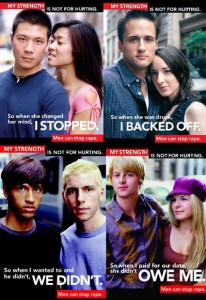Some thoughts on “sex by surprise” (feministe)
Category Archives: english
in gender and tech news: an anti-harassment policy
Following a great expose (“The Dark side of Open Source Conferences”) by Valerie Aurora on harassment and sexism in Open Source (technology that is horizontally integrated, anyone can collaborate on it, and its nuts and bolts are all transparent) conferences and communities, which has been making its rounds on feminist as well as tech sites, the blog Geek Feminism has posted a great conference anti-harassment policy template on their wiki. Aurora interviewed her female peers in the industry about the good and the bad of conferences, and compiled their answers, revealing a familiar “double-bind” insult women face in technology of being both sexualized as well as considered not as tech-savvy as their male peers […]
— “Geek Feminism Has you Covered at Conferences” @ bitchmedia
Call for papers: Interface 3/2, “Feminism, women’s movements and women in movement”
Interface: a journal for and about social movements
Call for papers, issue 3/2 (November 2011, deadline for submissions May 2011)
“Feminism, women’s movements and women in movement”
Issue editors: Catherine Eschle, Cristina Flesher Fominaya, Sara Motta, Laurence Cox
Feminist theory is a direct product of women’s movements, which in turn have been among the most powerful movements of recent decades and have had dramatic effects across societies. Despite this, much
contemporary feminist theory avoids questions of collective agency, and is often disconnected from movement activism. Conversely most scholarship on social movements ignores feminist analysis or at best
includes it as an add-on question about gendered participation. Arguably, such scholarship is reliant on restrictive conceptual frames that result in the invisibilisation, de-legitimisation and silencing of contemporary forms of feminism, women’s movement and women in movement. Both frameworks are therefore weak on understanding and conceptualising the nature of contemporary feminism-as-movement,
engaging with women’s agency in the construction of new forms of popular politics and opening up productive questions about political strategy.
This is particularly strange since women’s movements, and movements dominated by women (particularly those described as popular movements, movements of the poor or community movements), play a distinctive and characteristic role in local, national and global politics. They often expand the praxis of popular politics and social change in ways that politicise the subjective and the everyday, and include the spiritual, cultural and affective in their practices of resistance. Furthermore, feminist historical accounts in recent decades have highlighted the importance of women’s mobilisation, theories, pedagogies and approaches in everything from anti-imperialist movements, struggles around social reproduction and trade union organising to religious activism and top-down mobilisation in support of conservative regimes.
For this issue, we invite contributions on how feminist theory can help us understand the ways in which participation and collective action are gendered within social movements generally. We are equally
interested in the ways in which women’s movements, feminist activism and movements strongly marked by women’s participation but without a feminist identification have distinct approaches to politics ? or
operate in similar ways to other movements – and the political and strategic implications of their activities.
We are looking for contributions from feminist activists and scholars, participants in and students of women’s movements and movements marked by a feminisation of resistance, and social movement researchers with an interest in women’s agency, or how agency is gendered, in movements of all kinds.
10 books that challenged white, male literary dominance
from Flavorwire.com, an apology of sorts:
their list:
Toni Morrison, Beloved (1987)
Khaled Husseini, The Kite Runner (2003)
Donna Tartt, The Secret History (1992)
Margaret Atwood, The Handmaid’s Tale (1985)
Kazuo Ishiguro, Never Let Me Go (2005)
Arundhati Roy, The God of Small Things (1997)
Roberto Bolaño, 2666 (2004)
Chang-rae Lee, Native Speaker (1995)
Marjane Satrapi, Persepolis (2000)
Jeanette Winterson, Oranges Are Not the Only Fruit (1985)
The Feminist Poster Project: Call for action – call for contributions!
The Feminist Poster Project: A space to find + share feminist posters
The Feminist Poster Project is a new initiative to encourage designing, printing, sharing and distributing feminist posters and putting up them in public places. Sexist advertisement and misogynist media are all around us. If we want to fight this patriarchal propaganda, we have to produce our own images and messages. I would like to see feminist posters on walls, feminist signs over sexist ads, feminist stickers on street signs and feminist postcards in our letterboxes. I would like to see a change in our environments and a change in people’s minds. I hope the Feminist Poster Project can help to achieve this.Take a look at: http://feministposterproject.wordpress.com
more
addressing men: unfortunately still a novel approach to rape prevention
for once, a mainstream anti-rape campaign that in no way, shape, or form targets victims! … incredible!
(food for thought for “experts” like prof. dr. tudorel butoi)
the group that started the ad campaign: Men Can Stop Rape
why misogynists make great informants…
An article originally published in make/shift magazine (Spring/Summer 2010):
Why Misogynists Make Great Informants: How Gender Violence on the Left Enables State Violence in Radical Movements
… Despite all that we say to the contrary, the fact is that radical social movements and organizations in the United States have refused to seriously address gender violence as a threat to the survival of our struggles. We’ve treated misogyny, homophobia, and heterosexism as lesser evils—secondary issues—that will eventually take care of themselves or fade into the background once the “real” issues—racism, the police, class inequality, U.S. wars of aggression—are resolved. There are serious consequences for choosing ignorance. Misogyny and homophobia are central to the reproduction of violence in radical activist communities. Scratch a misogynist and you’ll find a homophobe. Scratch a little deeper and you might find the makings of a future informant (or someone who just destabilizes movements like informants do).
… Dismantling misogyny cannot be work that only women do. We all must do the work because the survival of our movements depends on it. Until we make radical feminist and queer political ethics that directly challenge heteropatriarchal forms of organizing central to our political practice, radical movements will continue to be devastated by the antics of Brandon Darbys (and folks who aren’t informants but just act like them). A queer, radical, feminist ethic of accountability would challenge us to recognize how gender violence is reproduced in our communities, relationships, and organizing practices. …
As angry as gender violence on the Left makes me, I am hopeful. I believe we have the capacity to change and create more justice in our movements. We don’t have to start witch hunts to reveal misogynists and informants. They out themselves every time they refuse to apologize, take ownership of their actions, start conflicts and refuse to work them out through consensus, mistreat their compañer@s. We don’t have to look for them, but when we are presented with their destructive behaviors we have to hold them accountable. Our strategies don’t have to be punitive; people are entitled to their mistakes. But we should expect that people will own those actions and not allow them to become a pattern.
We have a right to be angry when the communities we build that are supposed to be the model for a better, more just world harbor the same kinds of antiqueer, antiwoman, racist violence that pervades society. As radical organizers we must hold each other accountable and not enable misogynists to assert so much power in these spaces. Not allow them to be the faces, voices, and leaders of these movements. …
by Courtney Desiree Morris @ INCITE! Blog!
via Living Opposed to Violence and Exploitation
a little bit – and also a lot – about choices
“being a mother isnt always a choice, not yet.” by mai’a (guerilla mama medicine), guest-blogging @ feministe – all posts here
fun times with the second sex
Simone de Beauvoir, THE TWENTIETH CENTURY’S MOST DEPRESSING RELATIONSHIP ADVICE COLUMNIST!
ginecologie do-it-yourself
despre o zina care face parte din mobilobiblioteca fia [vom actualiza pagina in curind – o versiune mai recenta a catalogului se gaseste pe site-ul bibliotecii alternative, unde poposeste momentan mobilobiblioteca! UPDATE 19.07.2010: catalog actualizat]:
Hot Pantz begins with the sentence, “Patriarchy sucks,” and goes on to say:
It’s robbed us of our autonomy and much of our history. We believe that it’s integral for women to be aware and in control of our own bodies. The recipes we present here have been known for centuries, passed down from mother to daughter, and have survived the censorship of the witch hunts. Our intent is simple and practical: to help break away from the medical establishment’s tentacular grip on our bodies and our approaches to health and healing.
Hot Pantz provides readers with an understanding of anatomy, recipes to conquer yeast infections and hormonal imbalances, an extensive glossary of self-healing herbs, a list of aphrodisiacs, and it provides instructions on how to give foot massages that will alleviate cramps! …
Herbs predate history; women have been using herbs to treat cramps and bring on their menses for a long time. It’s no secret that natural medicine has been swept under the rug because of the pharmaceutical industry … While medical advancements have certainly provided more access to birth control and hormone therapy than ever before, I have a hard time believing the multi-billion dollar industry that creates these hormonal drugs is super concerned about women’s health. While we have access to these drugs, we do not have control over what goes into them, and pharmaceutical companies are not required to tell us. …
Perhaps part of the reason we talk so little about herbs is because we don’t want to knock drugs that have gone hand-in-hand with women’s liberation. In a recent interview with Bitch, Laura Eldridge (author of In Our Control: The Complete Guide to Contraceptive Choices for Women) spoke of how it is difficult to think critically of the Pill, especially as “acceptance of the Pill was an integral part of second wave feminism and as such allowed for many of the gains women have made.” It is indeed difficult to be critical of the Pill. It is also difficult to be taken seriously while talking about and promoting the use of herbs.
Hot Pantz makes it very clear that the zine is not intended to provide diagnosis or prescriptions. The zine is “an informative guide to help you better understand your body and your health”. They also make sure to state that if you are in doubt, you should not hesitate “to consult an herbal practitioner, naturopath, physician or gynecologist.” I also want to make it clear that I am not against the use of pharmaceuticals. They work for a lot of people. However, I do have a problem with the lack of transparency within the multi-billion dollar pharmaceutical industry that makes decisions about what is going to be available for women to put into their bodies. And I do think that herbal remedies should be more widely available and considered more seriously.
From the Bitch Library: Hot Pantz: Do It Yourself Gynecology



